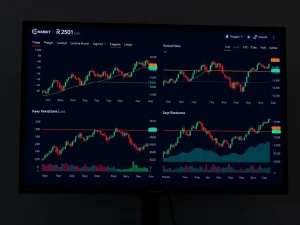Chainlink ETF: Bitwise Files Pivotal Application, Igniting Altcoin Market Optimism

The cryptocurrency market is buzzing with groundbreaking news. Bitwise, a prominent asset management firm, has officially become the first to file for a spot Chainlink ETF. This significant move signals a new era for digital asset investment, potentially opening doors for mainstream investors to gain exposure to Chainlink’s native token, LINK, through traditional financial vehicles. The development highlights the increasing institutional appetite for altcoins beyond Bitcoin and Ethereum, marking a pivotal moment for the crypto oracle platform.
Bitwise’s Groundbreaking Chainlink ETF Application
Bitwise Asset Management submitted its application to the Securities and Exchange Commission (SEC) on Tuesday. The filing details plans for an exchange-traded fund that will directly hold and track the price of Chainlink’s self-titled native token. This proposed fund, to be known as the Bitwise Chainlink ETF, marks a significant step for the altcoin market. Coinbase Custody is named as the custodian for the fund, ensuring secure storage of the underlying LINK tokens.
The ETF structure plans to facilitate in-kind creation and redemption. This means investors could buy and sell shares using the LINK token itself, offering a direct link to the asset. While Bitwise has not yet disclosed the ticker symbol, the specific exchange for listing, or the fee structure, the intent is clear. This is the inaugural filing for an ETF tracking Chainlink in the United States, underscoring Bitwise’s pioneering approach. Bitwise filed a Form S-1 for the fund. However, it must also submit additional paperwork, known as a Form 19b-4, to formally initiate the SEC’s approval process.
Understanding Chainlink (LINK) and Its Market Reaction
Chainlink operates as a decentralized oracle network. It securely connects smart contracts on various blockchains with real-world data, events, and payments. This critical function makes Chainlink a foundational piece of the decentralized finance (DeFi) ecosystem. Following Bitwise’s SEC filing, the market responded swiftly. The LINK price experienced an immediate uptick. CoinGecko data shows LINK gained 4.2% to reach $24.18 within 24 hours of the filing. This surge occurred amidst a broader positive movement in the cryptocurrency market.
Furthermore, LINK has demonstrated strong performance over the past month. It has gained more than 26% in the past 30 days. Despite these recent gains, LINK still trades significantly below its all-time high of nearly $53, achieved in May 2021. The news of the ETF filing provides a fresh catalyst for investor confidence. It suggests growing institutional recognition of Chainlink’s value and potential.
The Mechanics of a Spot Chainlink ETF
A spot Chainlink ETF would allow investors to gain exposure to LINK’s price movements without directly owning the cryptocurrency. This structure offers several benefits:
- Accessibility: It simplifies investment for traditional investors. They can buy shares through brokerage accounts.
- Security: The fund would handle the complexities of custody and security. Coinbase Custody’s involvement ensures a robust framework.
- Liquidity: ETFs typically offer high liquidity, allowing easy buying and selling of shares throughout the trading day.
The in-kind creation and redemption mechanism is crucial. It ensures the ETF’s share price closely tracks the underlying asset’s price. Authorized participants can create new ETF shares by depositing LINK tokens or redeem shares for LINK tokens. This process helps maintain market efficiency and prevents significant price discrepancies between the ETF shares and the actual LINK token.
The Expanding Landscape of Altcoin ETFs
The filing for a Bitwise Chainlink ETF is not an isolated event. It reflects a burgeoning trend within the digital asset space. Asset managers are increasingly pursuing a variety of crypto-linked ETFs. This surge in interest follows a more crypto-friendly tone from the current political administration. Bitwise itself has achieved considerable success with its existing ETFs. Their Bitcoin (BTC) and Ether (ETH) ETFs boast substantial assets under management. These stand at $2.26 billion and $460 million, respectively, according to Farside Investors. Such success demonstrates a clear demand for regulated crypto investment products.
Other firms are also exploring new frontiers. For instance, VanEck filed with the SEC to offer an ETF based on JitoSOL. This liquid staking token provides staking rewards. If approved, it would mark the first US ETF to offer exposure to digital assets that generate staking rewards. Grayscale Investments also sought SEC approval to convert its Avalanche (AVAX) trust into an ETF. Canary Capital recently filed for two distinct ETF products. One aims to hold Official Trump (TRUMP) tokens. The other, the Canary American-Made Crypto ETF (MRCA), seeks exposure to US-created, mined, or operated cryptocurrencies. These filings collectively underscore a growing appetite for diverse altcoin ETFs.
Navigating the SEC’s Stance on Crypto ETFs
The SEC has historically adopted a cautious approach to cryptocurrency ETFs. However, it recently approved spot Bitcoin and Ethereum ETFs. This shift provides a precedent for other digital assets. The approval process for a spot Chainlink ETF, like others, will be rigorous. The initial Form S-1 filing provides registration details. The subsequent Form 19b-4 filing formally proposes a rule change to allow the ETF to trade on an exchange. The SEC will scrutinize various factors:
- Market Surveillance: Ensuring robust mechanisms to prevent market manipulation.
- Custody Solutions: Assessing the security and reliability of the chosen custodian.
- Investor Protection: Verifying that the product offers adequate safeguards for investors.
The path to approval for altcoin ETFs may still present unique challenges. The SEC often considers market size, liquidity, and decentralization when evaluating such products. The successful navigation of these regulatory hurdles will be crucial for the Bitwise Chainlink ETF and others in the pipeline.
Future Outlook for Chainlink and Digital Asset Investment
The filing for a Chainlink ETF represents more than just a new investment product. It signifies a maturation of the cryptocurrency market. If approved, the Bitwise Chainlink ETF could significantly enhance Chainlink’s legitimacy and adoption. It would provide a regulated and accessible pathway for a broader range of investors to participate in the Chainlink ecosystem. This increased accessibility could, in turn, drive further liquidity and demand for the LINK token. Such a development might also encourage other asset managers to pursue similar products for other prominent altcoins. This could accelerate the integration of digital assets into traditional financial portfolios.
The ongoing trend of asset managers seeking diverse crypto ETFs points to an evolving investment landscape. As regulatory clarity improves and institutional confidence grows, digital assets are steadily becoming a more accepted asset class. The Bitwise Chainlink ETF filing is a testament to this ongoing evolution. It highlights the industry’s continuous efforts to bridge the gap between innovative blockchain technology and conventional finance, ultimately shaping the future of investment.






